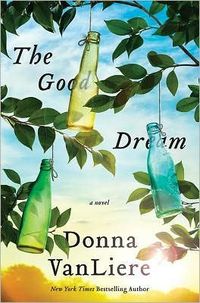 CRUEL SUMMER |
 Fall headfirst into July’s hottest stories—danger, desire, and happily-ever-afters await. |

Purchase
St. Martin's Press Women's Fiction Excerpt of The Good Dream by Donna VanLiereIvorie
I didn't set out to be an old maid. When I was in my early twenties there was, according to my mother, "still hope for me." But when I got into my late–twenties the hope all but left Mother's eyes. "Lord have mercy, Ivorie," she would say. "What is going to happen to you when your pop and I leave this earth?" I was, in her opinion, doomed to a bed–of–nails existence without a man.
Mother had always been fire and sizzle but there was something used up about her the last two years of her life. Her arthritis grew worse; gnarling her small, freckled hand into the shape of a claw and taking care of Pop wore what was left of her away. One afternoon, she came to me in the garden where she rested that crippled hand atop her cane and looked at me with those sad, cornflower blue eyes. "What about Lyle Hovitts?"
I nearly toppled the basket of beans I was picking. "That melon–headed man with the fat stomach and stumpy legs?" I threw my head back and laughed. "Mother! What have I done to you?"
She waved a bony hand in the air and rolled her eyes. "I'm just saying, Ivorie. You're a pretty girl."
I wiped the sweat off my face and squatted back down to my work. "Well I don't know why every pretty girl in Greene County isn't lined up outside Lyle Hovitts' door. What girl wouldn't want that old, saggy butt crawling into her bed every night?"
"Oh, Lord have mercy, Ivorie! It's too close to Sunday for such talk."
I laughed and tossed another handful of beans into the basket. "You started it, Mother. Lyle Hovitts. I'm surprised you didn't say Garth Landis." "There's nothing wrong with Garth Landis."
"He's a tall, lanky goon! He's got that sloped nose and those gangly arms with the hairy hands at the end of them. Plus—he must be fifty!" "He's a fine looking man."
My gallbladder shook I laughed so hard. "Well his beauty must be the kind that's magnified by liquor!" "He's tolerable," she said. "Not all men are tolerable but you could tolerate Garth."
I grabbed my head. "Is that what marriage is, Mother? Tolerating somebody?"
She looked at me like I was a kook. "Well, it has a lot to do with it! If you don't get sick looking at somebody, you're halfway there in tolerating them." I couldn't even respond to that. She started to hunch down and I waved my hand in the air at her. "Don't get down here. I'll have a world of a time getting you back up. I'll finish these. You just commence to worrying about which sad, lonely buck I need to hook my horns into." And when she leaned her bent, tiny frame over her cane and looked out over the garden I knew she was doing just that! Mother was my closest friend. We spent our time working in the garden, canning, cooking and baking together and we'd talk about Pop until we were both giggling like girls. We loved sitting down at the table and eating a slice of pound cake with a cup of coffee while we listened to Maxine Harrison read the news on the radio station out of Greenville. We'd shake our heads over the obituaries and talk about the poor, old widow who was left behind, or make a high–pitched noise in our throats on hearing about the birth of a new baby. Mother didn't wear a watch; she didn't need one, she just knew when it was coffee and cake time. It didn't matter where we were or what we were doing—if we were stooped over in the garden, Mother would say, "Coffee and cake time" and we would stop our work and sit down to listen to Maxine. I always knew when Mother was thinking she needed a rest with a glass of sweet tea and she could sense when I needed to pick up a book and hide out on the back porch. I've always been too impatient with myself and others, my expectations of them too high but Mother just loved people, plain and simple, warts and all. Her hope was always cell deep and child simple. My six brothers were all married with children. By the time I was born (when Mother was 42—a miracle anywhere) my oldest brother Henry was settled down with two children. Shoot, at my age Mother had had six of her seven children. Whenever I looked at her and Pop I could hear time speeding by me. Tick: There's a man! Tock: Better grab him! Tick: Time's running out! Tock: Too late. Morgan Hill, Tennessee is just seventy miles north of Knoxville but it's as far from the city as it is the ocean in my opinion. It's not big enough to be a city or even a town; we're a community—the Morgan Hill community. We've got Walker's Store, which my brother Henry owns, the Langley School Building, the church, and that's it (not exactly a hotbed for available suitors) but I can't imagine living anywhere else. These hills and farmland are home.
Pop served in Africa during the Great War and while there he held a piece of ivory in his hand, claiming it to be the prettiest thing he'd ever seen. He brought it home with him and laid it on the chest–of–drawers in his and Mother's bedroom. Mother held that piece of ivory the night I was born. I didn't come easy. "You about ripped me sideways to Christmas," Mother said. When Mother grasped for the sheets her friend Nola threw the ivory into her hand to give her something to hold onto. She and Pop named me Sarah Ivorie. I claimed Ivorie as my first name during my second year in school when another girl, a pinched face, puckered lip thug was also named Sarah. She was so sour that her cheeks turned red as a plum when she got mad. I told my mother that from here on out I would no longer share the name of Sarah with that brutish blob of a girl but would only answer to Ivorie. "Pretty name for a pretty girl," Mother said. Imagine the heartbreak when years later that pretty name wasn't attracting a husband. In the early years, right out of high school, the people in Morgan Hill still held out hope for me: Which young man do you have your eye on? Have you seen the way that Carl Winters makes over you? Before you know it you're going to have three or four proposals. But when I hit twenty–four and was still living at home it threw the whole community into crises mode. A distress signal spread throughout it: Awkward Walker girl doomed to manlessness. Gasp! I went from resident old maid to queen of the downtrodden parade. There I was, sitting high on my float and just waving and blowing kisses to the sorriest line–up of the lonely and cripple–hearted I've ever seen. The phone rang off the hook. Have you met my nephew, Lenny? He's the man with dropsy over in Midway. Have you ever met my Uncle Lew? His wife died two years ago and he's got a house full of good chil'ren. Have you met Harold over at the Co–op in Morristown? He's that real nice man that works there with the eye patch. Real funny man. Nice head of hair. For the longest time Ed Popper would visit on Sunday afternoon, bringing three oranges with him. We didn't get oranges too often in Morgan Hill so Ed would pick them up each week when he drove into Knoxville to visit an ailing aunt. Ed was five years older than me with a head as big as a hippopotamus and a face almost as ugly. His stomach rolled over his belt like a sack of corn meal and his feet always looked freakishly tiny and too narrow to hold up all that weight. We'd sit out on the front porch—Mother, Pop, me, and Ed Popper and we'd share those oranges and talk about the weather or who died, who was getting ready to die, or who we thought already died and as I watched orange juice drip down Ed's massive face I wondered why I couldn't die. Mother was thrilled with Ed's attention. He grew, these were her words, some of the prettiest tobacco in Greene County. Well slide a ring on my finger so I can be Mrs. Pretty Tobacco! Ed visited every Sunday for months and sat with his manure caked shoes pointed at opposite corners of the porch. All I had to do was take one look at those nasty shoes and my stomach would knot up. I have no idea why he came back as long as he did because I never gave him any reason to believe I wasn't anything other than completely bored. I was as comfortable with him as a frog is in a bottle. One Sunday, Ed brought a watermelon to us and I took it from him, marching it inside the well house where I set it on the floor and then closed the door on it. Ed swayed from foot to foot like an overweight pendulum for a while as Mother groped for something to say, her mouth gaping like a carp. Ed resigned himself to leaving and Mother rose to her feet. She said, "You didn't offer Ed Popper one slice of his watermelon and now he'll never long to come here again." If I had known that's what it would take to stop Ed Popper's longing I would have thrown his fruit in the well house months earlier.
Two years ago, in 1948, when I was twenty–eight and we buried Pop after eighty–two years of living in Morgan Hill, the community gave up on me. Polly Jarvis married Ed Popper, making her Polly Popper, a ridiculous name for a grown woman, and that marriage ended the community's hope to marry me off. People started referring to me as, that poor old thing. I heard them whispering at church or when I was shopping in Henry's store. "Ivorie just sits down there and takes care of her mother. That poor, old thing, I guess she'll never marry." I laughed out loud at a church picnic when I overheard two women, a cabbage–round faced one and skinny, ropy–armed one mumbling about my plight over a plate of fried chicken. "That poor old thing has never been with a man," Ropy Arms whispered.
"Well ain't that her good fortune!" Cabbage Face said.
Mother heard people talking, too and this old maid business worried her something awful. "Mother, I am happy," I said time and again. "I love my job at the school and I enjoy coming home and working in the garden and spending time with you." She'd look at me with those aging eyes and tree–like wrinkles that branched out from them and try to smile and there we'd stand: me trying to convince her that I was really okay and her not believing a word of it.
Time to time she'd get real quiet and glance up into the hills, the sun landing bright on her face, and say, "Don't live with regret, Ivorie. It's an awful thing."
For the longest time I thought she meant the regret of me not having a man but one day something struck me on the top part of my brain and I said, "Mother, what regrets do you have?" Law, she was quiet! A beetle made more noise breathing than she did. She stared up into the hills and finally said, "I have one and it plagues me terrible."
There was something in her voice that I'd never heard, or rather, something not in it that I wanted to hear. Her eyes and her mind were some place I couldn't go. "What is it, Mother?" She didn't answer. "Mother?" That's how we lived out what ended up being the last of her days. I knew she was tired and grieving. I knew her body was frail and knobbed with bone. What I didn't know was that her heart was weakening and breaking down. I woke up one morning and put the coffee and sausages on like I'd done every morning for years. Like clockwork I would hear the padding of her feet across the wide–planked floors but that morning the silence stretched from one room to the next and all I heard was the deafening tick, tick, tick of the clock hanging on the kitchen wall. The fire stopped burning and stars fell from the sky. I buried her six months ago in January, a month before my thirtieth birthday and on some mornings that time feels long as a mountain's shadow but short as a day. The void she left blows through the house and sometimes the emptiness chokes me. Death sure can work you over.
The house is quiet now and settled in sadness. On the most silent of nights, when the dark is cold and still I swear I can hear her shuffling down the hall toward me with the tap, tap, tap of her cane but when I turn to look, I know it's just me wishing she was here. There's always some maddening noise of emptiness here—the breeze against the windows, the rustle of trees, a creak in the floor or from the roof settling. Each night I wander the rooms and walk to the table with three legs that sets in the corner of Pop's bedroom and pull the chain on the lamp with the too heavy white base. The amber globe colors the room in a dull shade of yellow. This furniture is practical, sturdy, like Pop himself and while I don't particularly like it, it's too sentimental to sell. I reach for the dust rag I keep on the trunk at the end of the bed and polish the knobs on the iron bed that were always too much work to keep shiny. I move to Mother's room with the pretty eyelet curtains in the window and the cherry chest of drawers with the tall paw–footed legs that held her Bible on top. I haven't moved it since she died. I walk to the half–made quilt that lay in the rocking chair by the window. What will happen to it now? Who would take the care that Mother did with each square? What about that whining kitchen door she always complained about? What of the tractor tire that Pop said was bent or the dress without arms that lay on the cedar chest at the end of Mother's bed? Who would finish all this unfinished business and what would be the point? When I'm busy during the day I don't mind the thoughts or the quiet but never does the house seem as silent—so much like granite, as when I clunk around the empty rooms at night, when even the hushing noise the breeze makes sounds like a branch of iron against the windows. These rooms hold too many memories—too much laughter and anger and tears and outrageous moments happened here. Some people's lives are imprinted into a home like handprints. Seven children left their imprint here: Grady's robust laugh, James' disappointment, Lyle's gift of mercy, Howard's dry and ironic humor, Caleb's flash of anger, my spirit for fun and Henry's common sense way of meeting the day. Seven children were born here and two people left the world here. When Pop lay withering, the smell of his illness clung to the curtains and towels and when I took a breath it felt as if the house was consuming me. The morning that Mother died, the house didn't feel like death—smells of coffee and sausage saturated the rooms and seeped into the sheets, making her death so jarring to me. All the imprints of life are here but loneliness is as thick as mud inside these walls. School let out the second week of May and besides the two weeks at the end of the year and the two weeks prior to the beginning of the year when I either tie up loose ends or begin my secretarial work in the office and organizing the school library, I get the whole summer off. It's just me and my garden to harvest, berries to pick, Gertie to milk and this old house to keep running. These first six months of 1950 have gone by as slow as molasses in January; I can't imagine what the rest of summer is going to feel like.
The screen door groans as I open it and I sit out on the back porch, looking out over the garden. Sally runs to me, pushing her shaggy, blond head under my hand. She looks up at me at with sorrowful, brown eyes. She misses Mother too. We are a pitiful twosome but surely things will get better. Or worse. I never know. Excerpt from The Good Dream by Donna VanLiere |
|
| |||
|
||||




 © 2003-2025
© 2003-2025